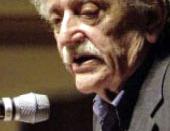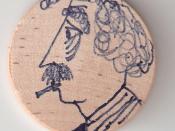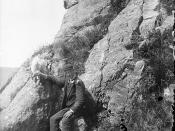Kurt Vonnegut has achieved high acclaim for many years and is often described as a dark-humorist or satirist. He is the writer/moralist of modern times; his unique style has often been compared to that of Mark Twain. One characteristic that makes Vonnegut stand out is his style of addressing themes. Like many writers, Vonnegut's novels are each directed toward a specific idea; however, the books also incorporate morals and themes that are frequently repeated. One such theme deals with scientific progress and its affect on the human condition. Vonnegut is wary of technology and society's eagerness to develop it; he endeavors to impart the same sense of caution upon his readers.
Kurt Vonnegut's ideals are not without basis. To begin with, he spent several months of World War Two as a POW in Germany. During this period, he witnessed the massacre of 135,000 civilians in Dresden (a larger massacre than Hiroshima).
From this point on, he was skeptical about science and its contributions to humanity. As he put it,
I thought... scientific truth was going to make us so happy and comfortable. What actually happened when I was twenty one was that we dropped scientific truth on Hiroshima. We killed everybody there. And I had just come home from... Dresden, which I'd seen burned to the ground. I have been a consistent pessimist ever since.
(Verde 83)
Vonnegut also spent several years working for the public relations department of a General Electric plant in New York. During this time, he witnessed the creation of many technological advancements. Yet the job only added to his pessimism about technology. He eventually left for Cape Cod, where he began to write for a living and produced his first novel, Player Piano.
Not surprisingly, the caution-of-progress theme is central to this piece. This...


